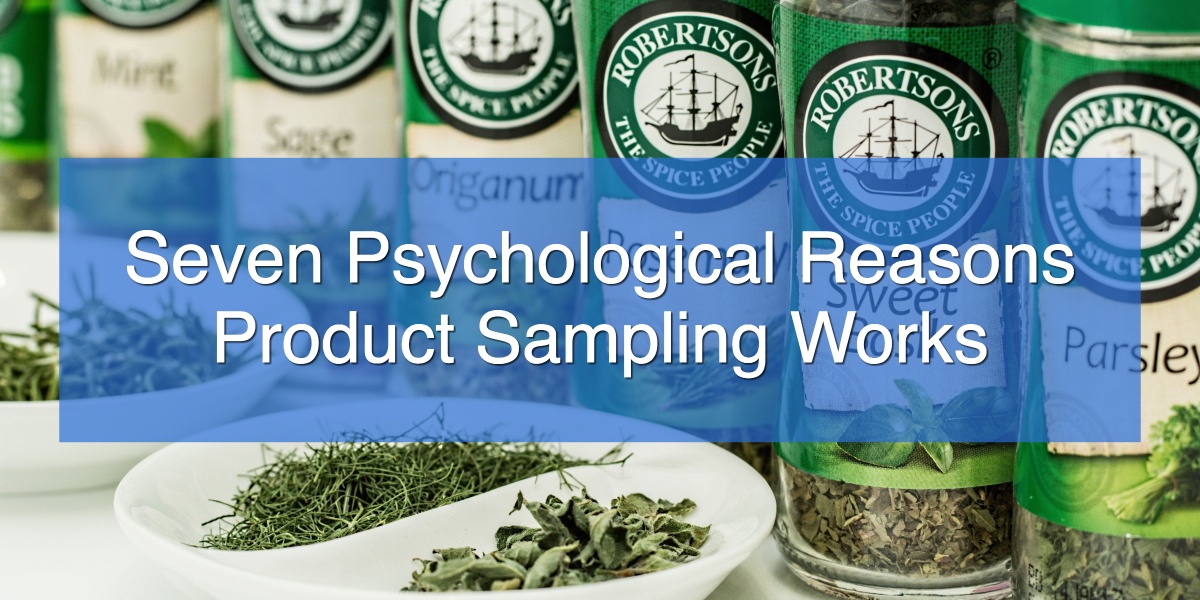There are dozens of reasons to use product sampling either in your venue or for your product. People love product samples and are much more likely to buy when there are samples offered, but why? What is that special little reaction inside someone's mind that influences them to buy when given a sample? There are more than one and they are shaped by who the buyer is, what you're offering, and whether or not they take it. The responses are emotional, personal, and often completely unplanned for. Sampling appeals to people on a psychological level and by being aware of that psychology, you can influence your target audience.
1) Returning the Favor
The first and most prominent form of psychological influence a sampling campaign can have is something commonly referred to as reciprocity. Humans have a natural sense of balance, especially when it comes to food, trade, and value. They want one side of things to match the other, like scales and symmetry, and it tends to bother them just a little bit when something doesn't seem quite right. Product sampling touches on this by giving customers something for free. While customers love free things, they also don't psychologically believe in free, triggering a desire to settle the balance. When this occurs they feel compelled to buy something, usually the sampled product, in order to return the favor.
2) Ignite a Craving
Certain foods, chemicals, and flavors are somewhat addictive. This isn't as insidious as it sounds, the language of food contains these concepts which are commonly accepted. People with a sweet tooth who love sugar are well known for having 'sugar cravings', which is a response a mild addiction and inescapable desire for sugar. Other items like chocolate and coffee are known to have a similar effect. Of course, not all food cravings are completely explicable. Some people just love a certain flavor and will always crave it even if it is not one of the traditionally addictive foods. Whether common or uncommon, just a taste of something delightful can ignite a craving for more in your clients.

3) In the Mood
If you start thinking about a particular food or meal, your body will begin to prepare to eat it. This is a great way to get geared up for whatever you're planning for supper but is also why you can experience a physically overwhelming disappointment when a meal is not what you expected. In other words, humans were made to eat what we've been thinking about. In this way, offerng free samples and talking about the sample in the store turn their minds toward the item and can begin the stomach preparing. After a little while thinking about your product in the store surrounded by the product and other ingredients that go well with it, they are ready to eat more of the sample even if they had not planned to buy any before.
4) Social Pressure
People are more likely to buy when others are nearby, especially if they are seen selecting something or engaged in some other focus-driving activity. This concept is easy to understand if you think about how you feel when perusing the canned goods aisle for your favorite brand and flavor when someone rolls up nearby. Suddenly the urge to grab a few cans and go is quite strong. Your samplers, the staff who man the sample tables) can even serve as that form of peer pressure, especially if stationed near the shelves of the product they are sampling. This tends to make people a little self-conscious and more likely to buy.
5) Brand Loyalty
Without background influences at all, people simply appreciate when you offer something nice and of value. Whether it's a sip of something delightful to a free download of a helpful app, they appreciate that your company and brand was willing to share with them something nice to have. This creates a positive customer relationship right off the bat. For new customers, they will feel gratified that you wanted to reach out and share with them and existing customers will be reassured that their original fondness for your brand was validated once again.
6) Reassurance
When customers are debating buying something new, the fear of making a mistake often causes them to decide against a purchase. Uncertainty that they will like a new flavor, texture, or find a place in their diet for an entirely new product will cause them to worry that a purchase will be a waste of their time and money. Sampling, however, offers the best kind of reassurance you can get for a consumable, experience. When they have personally smelled, examined, and tasted your product, they will gain a much more complete understanding of how much it could be enjoyed at home than they would looking at the outside of the packaging. This reassures them that their purchase will be rewarding and worthwhile.
7) The Inexplicable
Sometimes you have something entirely new to offer that your customers won't have encountered before. When your product is unexpected and difficult to explain, most people are not likely to make the impulse decision to buy it. Sampling provides them the opportunity to understand the product for what it really is rather than all the words it takes to explain it. This creates a powerful cycle as customer converts who realize they enjoy your inexplicable product are compelled to share some with their friends in the same way you shared it with them.


